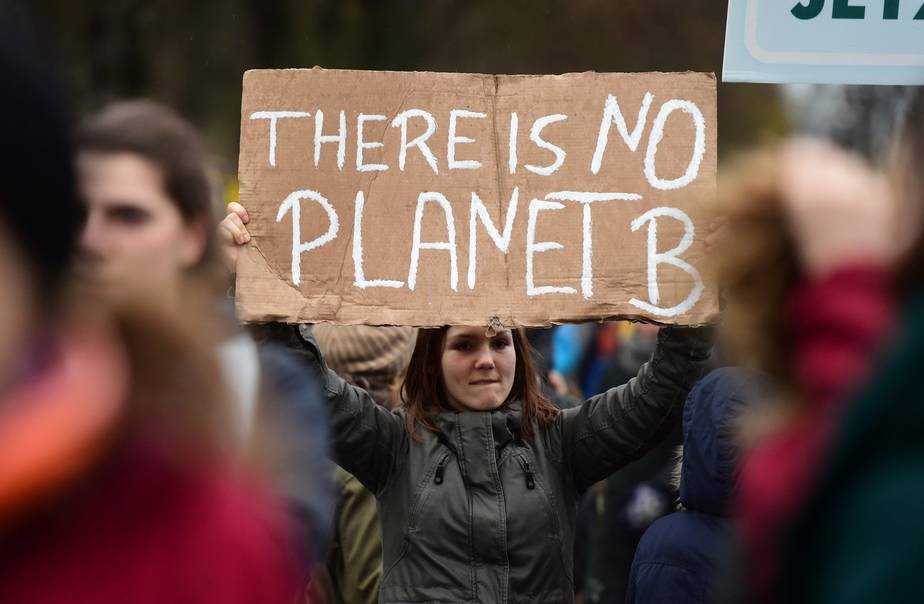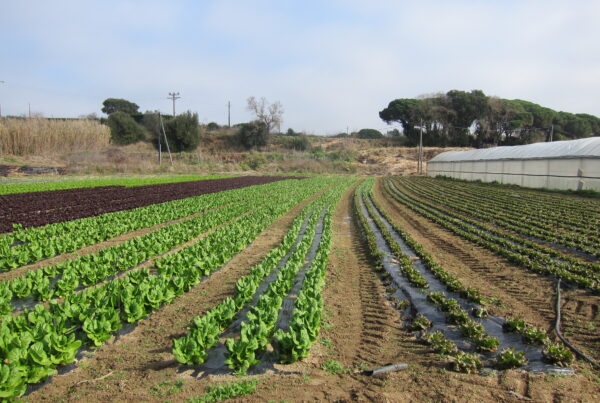By Stefania Barca*
Like all history writing—and much of science-making itself—environmental history cannot help but be political. Stefania Barca reflects on the political implications of what environmental historians do.

A participant holds a sign during the 2015 Global Climate March in Berlin. Source: John MacDougall / AFP / Getty Images.
“Only mass social movements can save us now.”
Naomi Klein makes this point in This Changes Everything, and I couldn’t agree more. Since their emergence in the global political arena in the 1960s and 1970s, mainstream environmental organizations have devoted more attention in the past three decades to governmental politics, corporate greenwashing, and lobbying, and less to popular pressure and coalition building from below. But it’s time to realize that this strategy has failed and that a new, stronger wave of popular mobilization based on a solid articulation between environmental and social justice claims is badly needed to produce radical ecological politics.
Environmental historians have been part and parcel of this story. Even when they have practiced this field of inquiry with politically detached attitudes, rejecting the idea of environmental history as an environmental-ist approach, they have in fact participated in the broader counter-movement of the 1980s and 1990s, shifting scholars’ attention away from “the political” and towards environmental “policy,” “governance” or “management.” In other words, it is impossible for environmental historians to be left alone in their academic ivory towers (or even in their favorite fields): they are inevitably involved in what is going on in society. Like all history writing—and much of science-making itself—environmental history cannot help but be political.

Enclosing Water. Source: The White Horse Press.
When I started work on my book Enclosing Water, my scientific interest lay in the history of waterpower as the first energy source of the Industrial Revolution; however, I soon realized that this was inextricably a part of the question of the “transition to capitalism,” with its social and ecological contradictions. I analyzed the transformation of water into waterpower based on four processes of material and symbolic violence:
1. war/colonial domination (to bring about the “liberation” of nature and labor from feudal control);
2. mechanization of labor (people being forcibly taken out of their homes and put to work under the factory discipline; women’s work being devalued and disempowered in the process);
3. transformation of the landscape (via river enclosures and flooding); and
4. naturalization of the new landscape and social order via art and literature.
What emerged was that “the political” was structurally embedded in the story of waterpower as the result of a class struggle—that of the emerging industrial bourgeoisie against the aristocracy for control over nature and labor. A great transformation, in the Polanyian sense, whose ecological implications had to be understood as a necessary part of its social costs.
But the appropriation of water was only one side of the double movement of enclosing and commoning. On the opposite side, even if not entirely visible, was the social struggle to create and defend the commons: the most historically grounded alternative to both capitalist and centrally planned economies, and the object of much radical ecological discourse and social practice today. This led me to think of my work as deeply embedded in “the political” and convinced me of the importance of reflecting on the political implications of what environmental historians do.
I believe that this politicization of environmental history requires us to revive interest in the historical agency of the working classes, potentially capable of leading the ecological revolution that we desperately need today. For this to succeed requires a critical revision of the definition of working class—one that is non-orthodox and which includes ecological interdependencies, feminist standpoints, and environmental justice.
I am convinced that neither technology nor technocracy can save us. We need a profoundly new vision of human destinies that eliminates the dominant western-centric and ultimately racist narratives of human “progress,” and which makes space for new, multiple, and profoundly ecological visions of what the word should mean to us.
What we need are not only decolonial, antiracist, antisexist, and class-conscious histories of what went wrong in humankind’s relationship with the planet, but also tales of liberation: emancipatory collective memories of how common people—working-class women and men, indigenous people, racialized social groups—have been capable of envisioning and fighting for non-destructive and non-exploitative relationships with their environments.
We need to abandon the idea of the white (sub)urban middle classes as the environmental heroes of our times and open our eyes to how countless “others” have suffered the true costs of the global ecological crisis and struggled for survival. This is of fundamental importance to a renewed vision of environmental politics as something to build with (rather than against) the 99%.
Environmental historians need to take up this issue through collaborative and transdisciplinary dialogue not only with the natural scientists, but also, crucially, with other scholars in the human and social sciences: eco-critics, political ecologists, environmental sociologists, anthropologists, philosophers, and ecological economists. I am convinced that we need to see ourselves, more and more, as members of this larger family that we call the Environmental Humanities. And that, together, we can perhaps reconsider our work as that of environmental-ist scholars.
* Stefania Barca is a senior researcher at the Centre for Social Studies, University of Coimbra, Portugal and a member of the ENTITLE Political Ecology Collective.
This post was originally published in the Rachel Carson Center blog and is the second in a series of posts exploring the uses of environmental history. The series has been adapted from contributions to a roundtable forum published in the first issue of the new Journal for Ecological History, edited by the Renmin University’s Center for Ecological History.






